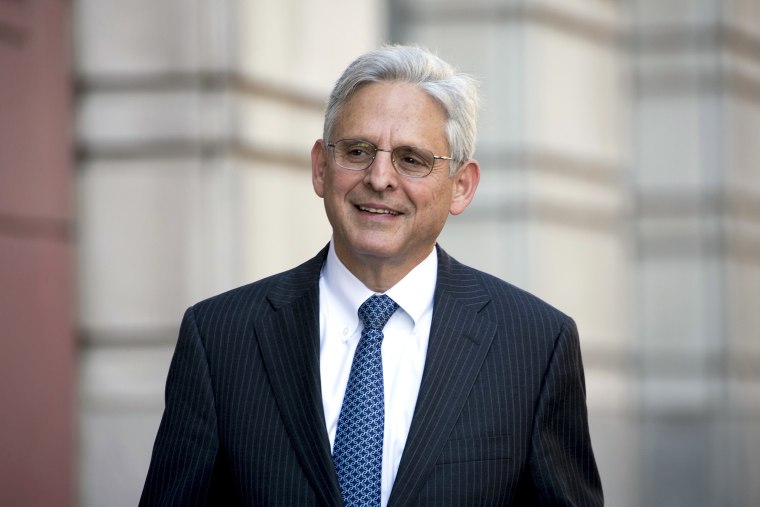President-elect Joe Biden will nominate Merrick Garland, the federal judge who Republicans denied a seat on the Supreme Court in 2016, to serve as his attorney general, two sources familiar with the matter told NBC News Wednesday.
News of Biden’s choice of Garland was first reported by Politico.
Garland, 68, has served as a judge on the U.S. Court of Appeals for the District of Columbia Circuit since 1997.
With Democrats expected to win a Senate majority after strong showings in both of Georgia’s runoff races, they would likely have an easier path in both confirming Garland as attorney general — and the nominee eventually named to replace him on the court.
Democrat Raphael Warnock defeated Republican Sen. Kelly Loeffler on Tuesday, NBC News projected, while Democrat Jon Ossoff is leading Republican David Perdue in the remaining critical runoff election in Georgia that will determine control of the Senate and potentially the fate of Joe Biden’s presidency.
If Ossoff wins, Democrats will retake control of the chamber, meaning Republicans won't be able to block Biden’s Cabinet appointments and judicial picks or as easily limit his legislative agenda.
Garland, a veteran jurist and a moderate, is seen as someone who could help restore the Justice Department’s independence — a Biden priority after criticism that President Donald Trump exerted too much influence over the department. His nomination would also allow Biden to appoint a younger judge to replace Garland on the critical D.C. Circuit Court of Appeals.
Biden advisers have discussed Ketanji Brown Jackson, 50, currently a judge on the U.S. District Court for D.C., to replace Garland, a source familiar with the matter told NBC News.
NBC News had reported last month that Biden has also been considering former Alabama Sen. Doug Jones and Sally Yates, a former deputy attorney general to be attorney general.
Garland rose to prominence in 2016 after then-President Barack Obama nominated him to fill the Supreme Court vacancy that opened up after the death of conservative jurist Antonin Scalia.
But Senate Republicans, who controlled the chamber then, refused to even hold a hearing for Garland, let alone a vote. They cited at the time something they dubbed the "Biden Rule" on judicial nominee hearings during election years, claiming that Supreme Court vacancies that emerge during election years should be filled by the next elected president.
Trump ultimately nominated Neil Gorusch for Scalia's seat, and the GOP-controlled Senate confirmed him in 2017.
However, Senate Republicans disregarded that so-called rule four years later, when, just days before the 2020 election, they voted to confirm to the high court Amy Coney Barrett, who had been nominated by Trump to fill the vacancy created by the death of Ruth Bader Ginsburg in September.
Garland served as the chief judge on the D.C. Circuit Court of Appeals from February 2013 to February 2020. As chief judge, he led investigations into some of the most high-profile cases and crises in modern history, including the 1996 Atlanta Olympics bombings and the “Unabomber” Ted Kaczynski, and coordinated the government’s response to the Oklahoma City bombing in 1995.
Biden has repeatedly expressed he wants his Justice Department to function independently from the White House, telling NBC News last month that he would want his attorney general to "enforce the law as the law is written, not guided by me."
"The attorney general of the United States of America is not the president's lawyer," he said.
Democrats have sharply criticized Trump's direct influence on Justice Department investigations, including his calls for Biden and Obama to be prosecuted over allegations of unspecified crimes.
Biden, however, has also privately told advisers that he doesn't want his presidency to be consumed by investigations of his predecessor — as NBC News reported in November — despite pressure from some Democrats who want inquiries into Trump, his policies and members of his administration.
But it will be difficult for Biden, and possibly Garland, if confirmed, to avoid the issue altogether, given the expected calls for investigations into an array of issues involving Trump — from his administration's child separation policy to his personal taxes, possible conflicts of interest and potential violations of campaign finance law.
The issue could set Biden on a collision course with some of his own supporters, who are eager for a wholesale examination of the Trump presidency.
That pledge by Biden may also come into conflict with the fact that federal authorities are investigating his son Hunter's taxes and examining his business dealings in China.
At least one prominent Trump-aligned Republican offered praise for Biden's choice on Wednesday, as Sen. Lindsey Graham of South Carolina tweeted that Garland "would be a sound choice to be the next Attorney General."
"He is a man of great character, integrity, and tremendous competency in the law," Graham tweeted.
Sources told NBC News that Biden is also expected to announce Lisa Monaco as deputy attorney general, Vanita Gupta as associate attorney general and Kristen Clarke as assistant attorney general for civil rights.
Together, a Biden official told NBC News, these nominees affirm Biden's commitment to restoring independence and integrity to the Justice Department, making sure its leadership team are "the American people's lawyers, not the president's law firm."
Monaco spent 15 years at the Department of Justice, eventually as associate deputy attorney general. She also served as homeland security and counterterrorism adviser to Obama.
Gupta is the former acting assistant attorney general for the civil rights division and is currently the president and CEO of the Leadership Conference on Civil and Human Rights.
Clarke, the president and executive director of the National Lawyers’ Committee for Civil Rights Under Law, is the former head of the civil rights bureau for the New York state attorney general’s office.



